1. Understanding the Basics
Before diving into the pros and cons of RVs and campers, it's essential to grasp the fundamental differences between the two. Both offer unique travel experiences, but they cater to different needs and preferences.
RV (Recreational Vehicle)
An RV, or Recreational Vehicle, is a motorized vehicle designed for accommodation. They come in various sizes and configurations, each tailored to specific travel needs.
-
Class A Motorhomes: These are the largest RVs, resembling buses. They offer a range of luxury amenities, from spacious living areas to full-sized kitchens and bathrooms. Ideal for those who don't want to compromise on comfort.
-
Class B Motorhomes (Camper Vans): These are the smallest motorized RVs. They're built on a van chassis and are easier to maneuver. While they have fewer amenities than Class A or C, they offer a cozy, compact travel experience.
-
Class C Motorhomes: These are mid-sized RVs, built on a truck chassis. They often have a distinctive over-cab sleeping area. They strike a balance between the size of Class A and the maneuverability of Class B.
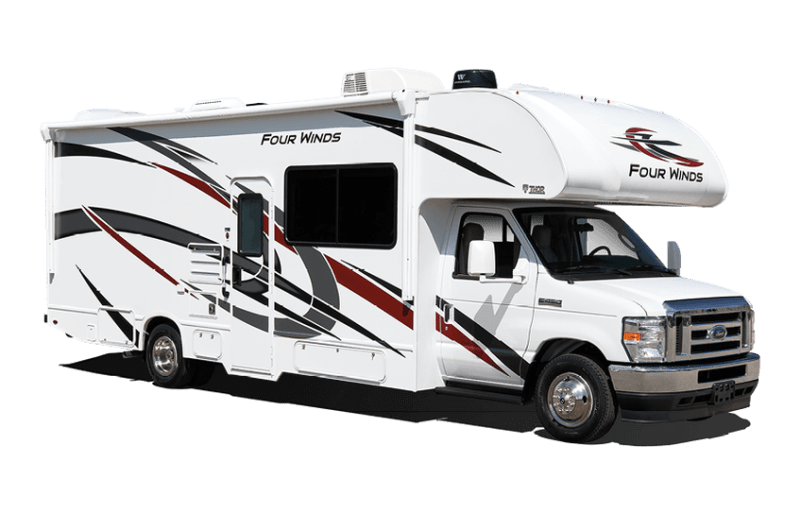
Camper
Campers, often referred to as travel trailers, are non-motorized towable vehicles. They're hitched to a car or truck for transportation. Unlike RVs, they don't have a driving cabin.
- Pop-Up Campers: These are lightweight, collapsible trailers. They're compact when towed and expand at the campsite. They offer basic amenities and are perfect for those looking for a more rustic camping experience.
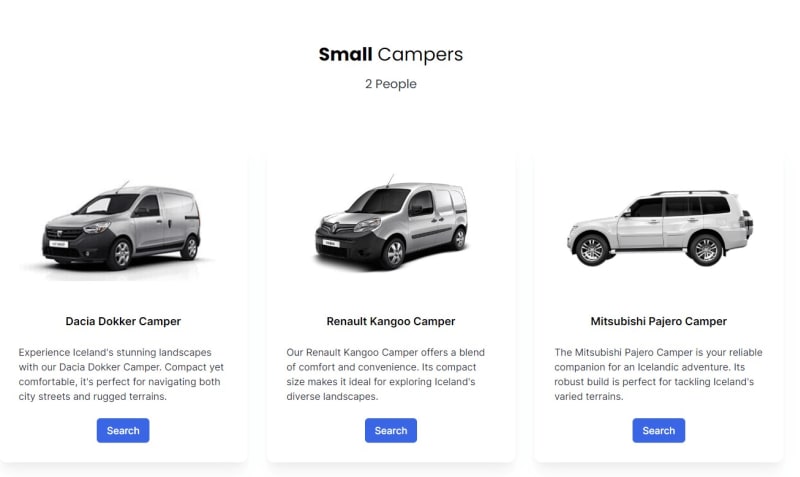
-
Teardrop Trailers: Small, streamlined, and shaped like a teardrop, these campers are ideal for solo travelers or couples. They often have a sleeping area and a basic kitchenette at the back.
-
Fifth-Wheel Campers: These are larger trailers, hitched to the bed of a pickup truck using a special 'fifth-wheel' hitch. They offer more living space and amenities compared to other campers.
By understanding these basic distinctions, you can better assess which vehicle aligns with your travel aspirations and practical needs.
2. Advantages of Traveling with an RV
RVs, with their motorized capabilities and range of sizes, offer a distinct set of benefits for travelers. Here are some of the primary advantages of choosing an RV for your journey:
Self-Contained Luxury
-
Full Amenities: Many RVs, especially Class A motorhomes, come equipped with all the comforts of home. From full kitchens and bathrooms to entertainment systems, you can enjoy a luxurious travel experience.
-
Spacious Interiors: With slide-out sections and well-designed layouts, RVs can offer surprisingly spacious living areas, making them ideal for families or groups.
Flexibility on the Road
-
Drive & Stay: The beauty of an RV is the ability to drive to your destination and stay in the same vehicle. No need to set up a separate campsite or check into a hotel.
-
Easy Rest Stops: If you're feeling tired or just want to enjoy a scenic spot a bit longer, you can easily pull over and rest or sleep in your RV.
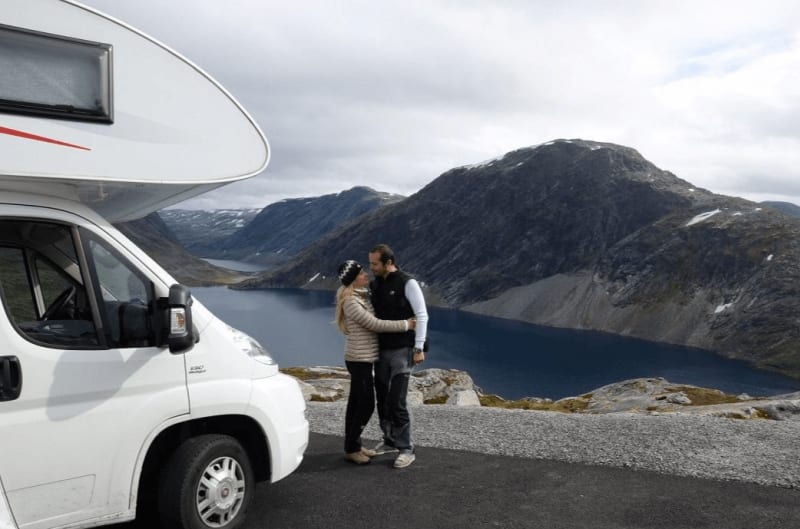
Cost-Effective Long-Term Travel
-
Save on Accommodation: While there's an initial investment or rental cost, traveling in an RV can save you money on hotels, especially during extended trips.
-
Cook On the Go: With a fully equipped kitchen, you can prepare meals, reducing dining out expenses.
Community & Camaraderie
-
RV Parks & Campgrounds: These specialized accommodations often foster a sense of community. Meet fellow travelers, share stories, and make new friends on the road.
-
Specialized Facilities: Many RV parks offer amenities like swimming pools, recreational areas, and communal BBQs, enhancing your travel experience.
Opting for an RV can transform your travel experience, merging the thrill of the open road with the comforts and conveniences of home.
3. Benefits of Opting for a Camper
Campers, often synonymous with adventure and freedom, are a popular choice for many travelers. Here's why opting for a camper can be a fantastic decision:
Compact & Agile
-
Easy Maneuverability: Campers are typically smaller than RVs, making them easier to drive, especially on winding roads or in busy city centers.
-
Access Remote Locations: Their compact size allows campers to reach off-the-beaten-path destinations that larger vehicles might struggle with.
Simplicity & Minimalism
-
Less is More: Traveling in a camper encourages a minimalist lifestyle. With limited space, you'll prioritize essentials, leading to a more focused and often more fulfilling travel experience.
-
Quick Setup: Arrive at your destination, and you're almost instantly set up for the night. No extensive preparations needed.
Economical Travel
-
Fuel Efficiency: Campers, being smaller and lighter, often offer better fuel efficiency compared to larger RVs.
-
Lower Rental & Maintenance Costs: Renting or maintaining a camper can be more affordable than its larger counterparts, making it a budget-friendly option.
Close to Nature
-
Intimate Camping Experience: Campers provide a more traditional camping feel, allowing you to connect closely with nature.
-
Versatile Parking: While RVs might require specific parks or facilities, campers can often be parked in a wider variety of natural settings, from beachfronts to mountain bases.
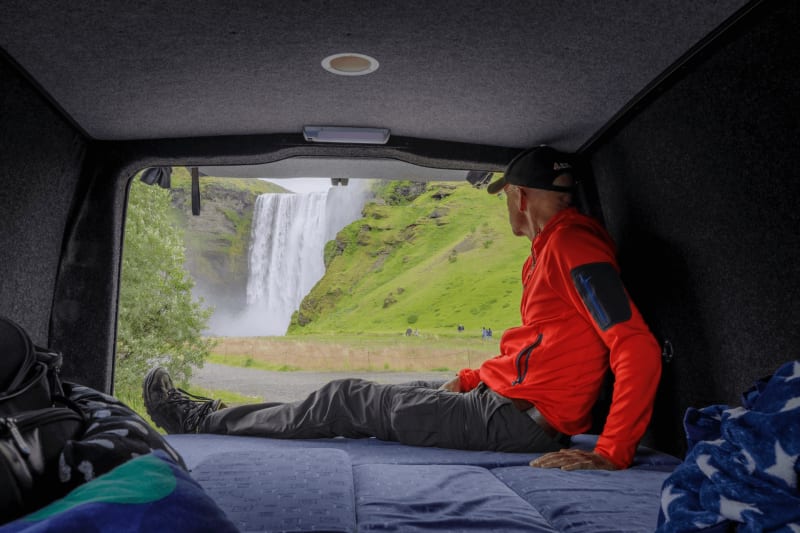
Choosing a camper can offer a unique blend of convenience and adventure, making it a top choice for those looking to immerse themselves in the landscapes they explore.
4. Considerations When Making Your Choice
When deciding between an RV and a camper, it's essential to weigh various factors to ensure you make the best choice for your travel needs and preferences. Here are some key considerations:
Trip Duration & Distance
-
Short vs. Long Trips: For shorter getaways, a camper might be more convenient due to its simplicity. However, for extended journeys, the amenities and comfort of an RV could be more appealing.
-
Travel Distance: If you're covering vast distances, consider the fuel efficiency and comfort of your vehicle, especially for long drives.
Destination & Terrain
-
Accessibility: Some remote or rugged destinations might be more accessible with a compact camper, while others with established facilities might cater better to RVs.
-
Camping Facilities: Research your destinations to see if they have specific facilities or restrictions for larger vehicles.
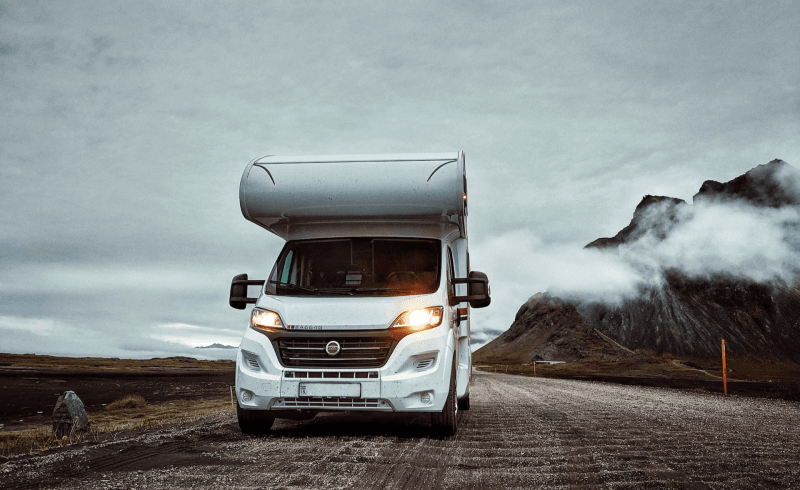
Budget
-
Rental & Maintenance Costs: Generally, campers might be more affordable to rent and maintain than RVs. However, consider the amenities you're getting in return.
-
Fuel Costs: Smaller campers tend to be more fuel-efficient than larger RVs.
Travel Party
-
Number of Travelers: If you're traveling with a large group or family, the space and amenities of an RV might be more suitable.
-
Preferences & Comfort: Consider the comfort preferences of your travel companions. Some might prioritize a spacious living area, while others might value the adventure of a minimalist camper experience.
Amenities & Lifestyle
-
Facilities Needed: If you prefer having a full kitchen, separate sleeping areas, or a spacious bathroom, an RV might be the better choice.
-
Travel Style: If you lean towards a more adventurous, close-to-nature experience, a camper could be the perfect fit.
Remember, there's no one-size-fits-all answer. It's about aligning your choice with your travel goals, preferences, and the kind of experience you wish to have.
5. Real-Life Stories: RV and Camper Adventures
Hearing firsthand experiences can provide invaluable insights when making your choice. Here are some real-life stories from travelers who've explored Iceland in both RVs and campers:
Anna & Mark's Two-Week RV Expedition
Anna and Mark, a couple from Germany, embarked on a two-week journey across Iceland in an RV. They cherished the convenience of having a mobile home, especially during the chilly nights. The RV's heating system ensured they were always cozy, and the onboard kitchen allowed them to cook hearty meals after long days of exploring.
"The RV was like our little moving house. We loved the freedom of deciding where to stop for the night and waking up to different scenic views each morning." - Anna
Solo Traveler Jake's Camper Van Adventure
Jake, a solo traveler from Australia, opted for a camper van for his 10-day Icelandic adventure. He loved the simplicity and flexibility it offered. Parking by the beach, cooking meals on a portable stove, and gazing at the Northern Lights from the back of his camper were some of his trip's highlights.
"Traveling in a camper van felt like a raw, authentic adventure. Every day was different, and the compact size meant I could easily navigate through narrow mountain paths." - Jake
The Smith Family's RV Summer Vacation
The Smiths, a family of five from the USA, chose an RV for their summer vacation in Iceland. With three kids, the spacious RV provided the comfort and amenities they needed. They appreciated having separate sleeping areas and the convenience of an onboard bathroom for the kids.
"Traveling with kids can be challenging, but the RV made our trip so much smoother. It was like bringing a piece of home with us on the road." - Mrs. Smith
Lena's Off-the-Beaten-Path Camper Experience
Lena, a photographer from Sweden, rented a camper van for her month-long journey to capture Iceland's hidden gems. The camper's compact size allowed her to reach remote locations, and she often found herself alone in breathtaking landscapes.
"The camper became my mobile photography studio. I could drive to secluded spots, capture the golden hour, and then sleep under the stars." - Lena
These stories highlight the diverse experiences RVs and campers can offer. Whether you're seeking comfort and convenience or a raw, immersive adventure, there's a vehicle out there that's perfect for your Icelandic journey.
6. Making the Final Decision: Questions to Ask Yourself
Before you finalize your choice between an RV or a camper for your Icelandic adventure, it's essential to reflect on your travel preferences, needs, and expectations. Here are some crucial questions to guide your decision-making process:
What's Your Budget?
While both RVs and campers offer a range of options, generally, campers might be more budget-friendly in terms of rental costs. However, RVs might save you on some amenities like dining if you utilize the onboard kitchen.
"Budgeting ahead of time can help narrow down your options and ensure you get the best value for your money."
How Many People Are You Traveling With?
If you're traveling solo or as a couple, a camper might suffice. However, for larger groups or families, the spaciousness of an RV could be more comfortable and convenient.
"Consider not just sleeping arrangements, but also the day-to-day living experience when choosing your vehicle."
What Amenities Are Essential for You?
Do you need a full bathroom, a larger kitchen, or separate sleeping areas? RVs tend to offer more onboard amenities, while campers provide a more minimalist travel experience.
"List out your non-negotiable amenities to help guide your choice."
How Long is Your Trip?
For shorter trips, the simplicity of a camper might be appealing. However, for extended journeys, the comforts of an RV could make a significant difference.
"The length of your trip can influence the level of comfort and convenience you might desire."
Where Do You Plan to Stay Overnight?
While both RVs and campers are welcomed at most Icelandic campsites, some remote or smaller sites might be more accessible with a compact camper.
"Research your desired overnight stops in advance to ensure they can accommodate your chosen vehicle."
Are You Comfortable Driving Larger Vehicles?
Driving an RV requires more skill and confidence than maneuvering a smaller camper, especially on Iceland's diverse terrains.
"Consider your driving experience and comfort level when choosing between a larger RV and a more compact camper."
By reflecting on these questions and aligning them with your travel goals, you can make an informed decision that ensures an unforgettable Icelandic adventure tailored to your preferences.
Conclusion
Choosing between an RV and a camper for your Icelandic journey is a decision that hinges on personal preferences, travel goals, and the kind of experience you seek. Both options offer unique advantages that cater to different types of travelers.
RVs provide a touch of luxury, space, and comfort, making them ideal for those who don't want to compromise on amenities. On the other hand, campers offer a more intimate connection with nature, simplicity, and flexibility, perfect for the adventurous spirit.
"Remember, there's no one-size-fits-all answer. The best choice is the one that aligns with your vision of the perfect Icelandic adventure."
As you embark on this exciting journey, whether through the vast landscapes in an RV or the winding roads in a camper, the memories you create will be priceless.
Iceland awaits, and the open road beckons. Safe travels!


